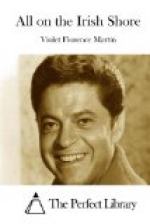“What do you think of my new buy?” he said pacifically, “she’s a good goer, isn’t she?”
“Very,” replied Fanny.
Silence again reigned. One or two further attempts at conversation met with equal discouragement. The miles passed by. At length, as the mare slackened to walk up a long hill, Rupert said with a voice that had the shake of pent-up injury:—
“I’ve been wondering what I’ve done to be put into Coventry like this!”
“I thought you probably wouldn’t care to speak to me!” was Fanny’s astonishing reply, delivered in tones of ice.
“I!” he stammered, “not care to speak to you! You ought to know—”
“Yes, indeed, I do know!” broke in Fanny, passing from the frigid to the torrid zone with characteristic speed, “I know what a failure your horse-dealing at the Dublin Show was! I’ve heard how you bought my mare, and had her shot the same night, because you wouldn’t take the trouble even to go and look at her after the poor little thing was hurt! Oh! I can’t bear even to think of it!”
Rupert Gunning remained abjectly and dumfoundedly silent.
“And then,” continued Fanny, whirling on to the final point of her indictment, “you pretended to Captain Carteret and me that the horse you had bought was ‘a common brute,’ a cob for carting, and you said the other night that you had made a fool of yourself over it! I didn’t know then all about it, but I do now. Captain Carteret heard about it from the dealer in Dublin. Even the dealer said it was a pity you hadn’t given the mare a chance!”
“It’s all perfectly true,” said Rupert, in a low voice.
A soft answer, so far from turning away wrath, frequently inflames it.
“Then I think there’s no more to be said!” said Fanny hotly.
There was silence. They had reached the top of the hill, and the grey mare began to trot.
“Well, there’s just one thing I should like to say,” said Rupert awkwardly, his breath coming very short, “I couldn’t help everything going wrong about the mare. It was just my bad luck. I only bought her to please you. They told me she couldn’t get right after the accident. What was the good of my going to look at her? I wanted to cross in the boat with you. Whatever I did I did for you. I would do anything in the world for you—”
It was at this crucial moment that there arose suddenly from the dim grey road in front of them a slightly greyer shadow, a shadow that limped amid the clanking of chains. The Connemara mare, now masquerading as a County Cork cob, asked for nothing better. If it were a ghost, she was legitimately entitled to flee from it; if, as was indeed the case, it was a donkey, she made a point of shying at donkeys. She realised that, by a singular stroke of good fortune, the reins were lying in loops on her back.
A snort, a sideways bound, a couple of gleeful kicks on the dashboard, and she was away at full gallop, with one rein under her tail, and a pleasant open road before her.




